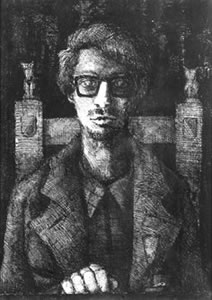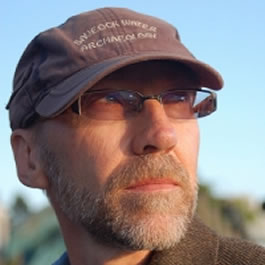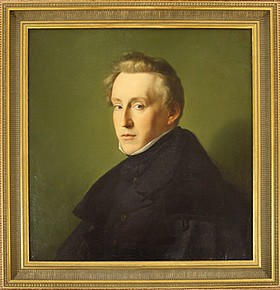|
De Nederlandse schrijfster en beeldend kunstenares Dirkje Kuik werd geboren in Utrecht op 7 oktober 1929. Zie ook mijn blog van 7 maart 2008 en ook mijn blog van 7 oktober 2009.xml:namespace prefix = o ns = "urn:schemas-microsoft-com:office:office" />
Het museum Jo, weet je nog
Het museum Jo, weet je nog,
kleine vriendelijke doffer, wie weet.
Alle schilderkunst sloegen we
over, behalve Sinte Caecilia
en de graflegging, ons heer
in zijn glazen kastje, schilder
de mensen van pintor Scorel zegt men.
Zeer beschadigd waren we, dronken
van vroeger en wijn, venijn van de kunst,
een gunst zo maar gegeven, drie gulden,
aangeschoten doffer weet je nog, de toegang.
Metamorfose
Vandaag ben ik een lekkker dier,
eenhoorn, hoewel ten halve stier, een fabel.
Morgen wellicht Jan zonder land
Och arme kruidenier,
de kat met negen staarten.
Het boegbeeld van een schip, gestrand,
een zeemeermin gebleven na de vloed,
Krake, de leden in het vissersnet, verlaten,
Kleio, de neus in het zand.

Dirkje Kuik (7 oktober 1929 18 maart 2008)
Zelfportret, 1955
De Canadese schrijver, archeoloog, antropoloog Steven Erikson (pseudoniem van Steve Rune Lundin) werd geboren in Toronto op 7 oktober 1959. Zie ook mijn blog van 7 maart 2008 en ook mijn blog van 7 oktober 2009.
Uit: Memories Of Ice
Swallows darted through the clouds of midges dancing over the mudflats. The sky above the marsh remained grey, but it had lost its mercurial wintry gleam, and the warm wind sighing through the air above the ravaged land held the scent of healing.
What had once been the inland freshwater sea the Imass called Jaghra Til born from the shattering of the Jaghut ice-fields was now in its own death-throes. The pallid overcast was reflected in dwindling pools and stretches of knee-deep water for as far south as the eye could scan, but none the less, newly birthed land dominated the vista.
The breaking of the sorcery that had raised the glacial age returned to the region the old, natural seasons, but the memories of mountain-high ice lingered. The exposed bedrock to the north was gouged and scraped, its basins filled with boulders. The heavy silts that had been the floor of the inland sea still bubbled with escaping gases, as the land, freed of the enormous weight with the glaciers passing eight years past, continued its slow ascent.
Jaghra Tils life had been short, yet the silts that had settled on its bottom were thick. And treacherous.
Pran Chole, Bonecaster of Cannig Tols clan among the Kron Imass, sat motionless atop a mostly buried boulder along an ancient beach ridge. The descent before him was snarled in low, wiry grasses and withered driftwood. Twelve paces beyond, the land dropped slightly, then stretched out into a broad basin of mud.
Three ranag had become trapped in a boggy sinkhole twenty paces into the basin. A bull male, his mate and their calf, ranged in a pathetic defensive circle. Mired and vulnerable, they must have seemed easy kills for the pack of ay that found them.
But the land was treacherous indeed. The large tundra wolves had succumbed to the same fate as the ranag. Pran Chole counted six ay, including a yearling. Tracks indicated that another yearling had circled the sinkhole dozens of times before wandering westward, doomed no doubt to die in solitude.
How long ago had this drama occurred? There was no way to tell. The mud had hardened on ranag and ay alike, forming cloaks of clay latticed with cracks. Spots of bright green showed where windborn seeds had germinated, and the Bonecaster was reminded of his visions when spiritwalking a host of mundane details twisted into something unreal. For the beasts, the struggle had become eternal, hunter and hunted locked together for all time.

Steven Erikson (Toronto, 7 oktober 1959)
De Duitse, romantische dichter Wilhelm Müller werd geboren op 7 oktober 1794 in Dessau. Zie ook mijn blog van 7 oktober 2006 en ook mijn blog van 7 maart 2008 en ook mijn blog van 7 oktober 2009.
Der Müller und der Bach
[Der Müller]
Wo ein treues Herze
In Liebe vergeht,
Da welken die Lilien
Auf jedem Beet.
Da muß in die Wolken
Der Vollmond gehn,
Damit seine Tränen
Die Menschen nicht sehn.
Da halten die Englein
Die Augen sich zu,
Und schluchzen und singen
Die Seele zu Ruh
[Der Bach]
Und wenn sich die Liebe
Dem Schmerz entringt,
Ein Sternlein, ein neues,
Am Himmel erblinkt.
Da springen drei Rosen,
Halb rot, halb weiß,
Die welken nicht wieder,
Aus Dornenreis.
Und die Engelein schneiden
Die Flügel sich ab,
Und gehn alle Morgen
Zur Erde hinab.
[Der Müller]
Ach, Bächlein, liebes Bächlein,
Du meinst es so gut:
Ach, Bächlein, aber weißt du,
Wie Liebe tut?
Ach, unten, da unten,
Die kühle Ruh!
Ach, Bächlein, liebes Bächlein,
So singe nur zu.

Wilhelm Müller (7 oktober 1794 1 oktober 1827)
Mogelijke schilders: Johann Heinrich Beck of Franz Krüger
|



